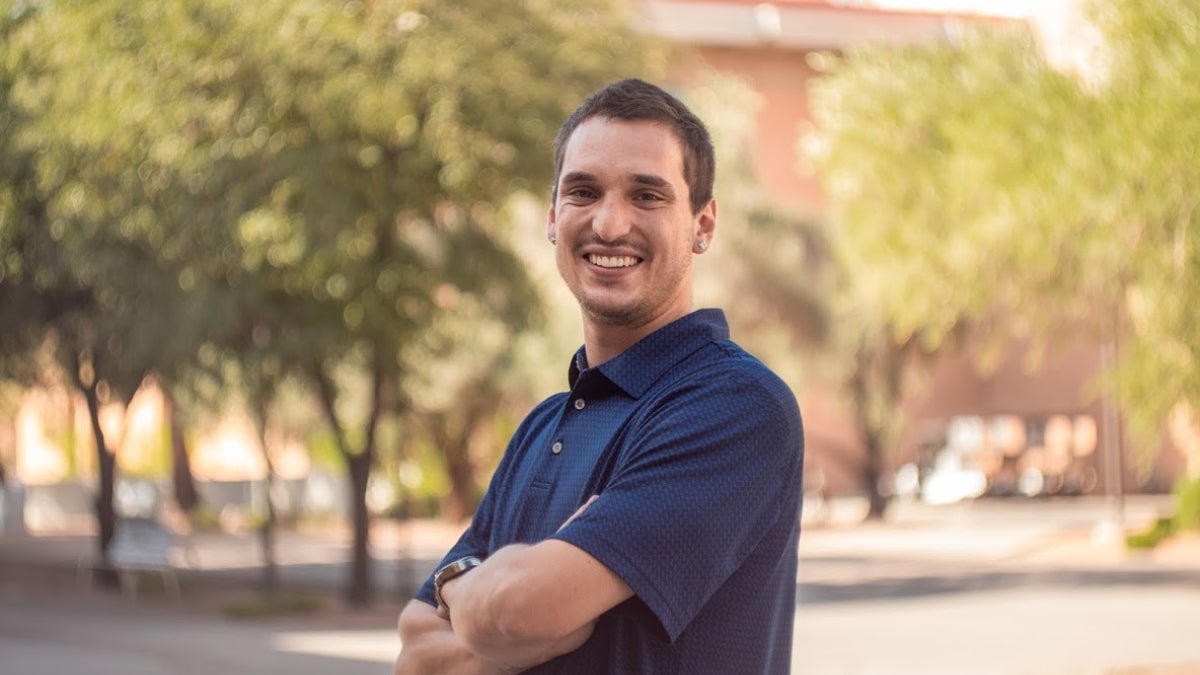ASU master's degree student maximizes every opportunity to understand behavior

Tristan Lyle, a graduate student in ASU's applied behavior analysis master's degree program. Photo by Robert Ewing.
Working with at-risk youth in the juvenile correction system led Arizona State University’s Tristan Lyle to enroll in the Department of Psychology's Master of Science in Applied Behavioral Analysis program.
“Many of the kids came in with a chip on their shoulder, and being able to help many of them work through behavioral problems and really make a difference was amazing,” said Lyle, who is now a second-year graduate student in the program.
He has excelled in the program, petitioning the Department of Psychology to write and defend a thesis instead of completing a capstone project and working as a volunteer student reviewer for journal manuscripts.
“Dr. Don Stenhoff has been helping me one-on-one, both teaching me to be a student reviewer for manuscripts and to look at research through a reviewer’s lens,” Lyle said. “Working with him has helped me tremendously on my own research.”
Lyle also hopes to contribute as an author on a manuscript this year.
“Tristan is a great student to work with. He continually works hard to further his knowledge in behavior analysis in practice, in basic research, and applied research," said Stenhoff, an assistant clinical professor of psychology. "Ultimately, he wants to improve societal issues, which shows by the enthusiasm he has for all that he does.”
One of the hallmark components of this master's degree program is the included 1,500 hours of practicum experience that prepares students for licensure. Students in the program have a 92% pass rate on the licensing test in part because of the rigorous curriculum and the practicum experience. For his practicum experience, Lyle works at InBloom Autism services, helping students on the autism spectrum to improve socially significant behaviors, like communication skills.
READ MORE: MS ABA program expands with virtual synchronous learning option
In addition to his full load as a graduate student and working as a graduate teaching assistant, Lyle also volunteers in the Basic Behavioral Processes Lab, led by Federico Sanabria, associate professor of psychology. In the lab, Lyle stains and identifies neurons, is learning how to build operant conditioning Skinner boxes, write code for data analysis and analyze data.
“Lyle’s outstanding enthusiasm for behavior research is reflected in his commitment to the lab. He has demonstrated not only a talent and an inclination for working with laboratory animals, but also for analyzing data. His analytic skills have been critical to support the lab under the current challenging circumstances,” Sanabria said.
Lyle hopes this research experience will give him a better overall understanding of how the behavioral interventions used in applied behavioral analysis alter both observable behavior and the structure of the brain.
“I love the idea of potentially being able to see causal mechanisms in behavior,” Lyle said. “The more I learn, the more I want to do. The skills I’m learning now — I’m going to use them the rest of my life.”
Biggest supporter
Lyle credits his motivation to excel in the master's degreee program to his time as a multisport athlete in high school and to his wife, who was the kicker on the football team and is now studying at the Southwest College of Naturopathic Medicine.
“When we competed, we lived by the mantra that there is always someone just as talented as you are, but you can outwork them,” Lyle said.
In the future, Lyle hopes to complete a doctorate and work in private practice as a Board Certified Behavioral Analyst.
More Science and technology

ASU and Deca Technologies selected to lead $100M SHIELD USA project to strengthen U.S. semiconductor packaging capabilities
The National Institute of Standards and Technology — part of the U.S. Department of Commerce — announced today that it plans to…

From food crops to cancer clinics: Lessons in extermination resistance
Just as crop-devouring insects evolve to resist pesticides, cancer cells can increase their lethality by developing resistance to…

ASU professor wins NIH Director’s New Innovator Award for research linking gene function to brain structure
Life experiences alter us in many ways, including how we act and our mental and physical health. What we go through can even…